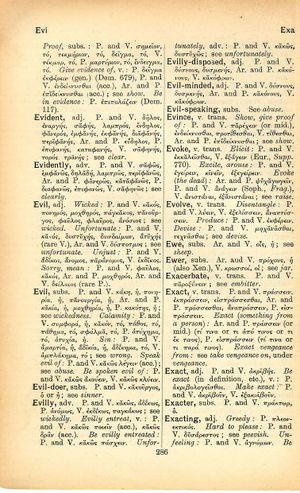exacting: Difference between revisions
From LSJ
Οὕτως ἔδειξέν μοι κύριος καὶ ἰδοὺ ἐπιγονὴ ἀκρίδων ἐρχομένη ἑωθινή, καὶ ἰδοὺ βροῦχος εἷς Γωγ ὁ βασιλεύς (Amos 7:1) → Thus the Lord showed me and look, early-morning offspring of locusts coming, and look, one locust-larva: Gog the king.
(CSV4) |
m (Woodhouse1 replacement) |
||
| Line 1: | Line 1: | ||
{{Woodhouse1 | {{Woodhouse1 | ||
|Text=[[File:woodhouse_286.jpg|thumb|link={{filepath:woodhouse_286.jpg}}]] | |Text=[[File:woodhouse_286.jpg|thumb|link={{filepath:woodhouse_286.jpg}}]] | ||
===adjective=== | |||
[[greedy]]: [[prose|P.]] [[πλεονεκτικός]]. | |||
[[hard to please]]: [[prose|P.]] and [[verse|V.]] [[δυσάρεστος]]; see [[peevish]]. | |||
[[unfeeling]]: [[prose|P.]] and [[verse|V.]] [[ἀγνώμων]]. | |||
[[unfeeling]]: [[prose|P.]] and [[verse|V.]] [[ἀγνώμων]]. | |||
[[be exacting]], v.: [[prose|P.]] [[πλεονεκτεῖν]]. | |||
[[difficalt to deal with]]: [[Aristophanes|Ar.]] and [[prose|P.]] [[χαλεπός]], [[prose|P.]] and [[verse|V.]] [[ἄπορος]]. | |||
}} | }} | ||
Revision as of 08:54, 20 May 2020
English > Greek (Woodhouse)
adjective
hard to please: P. and V. δυσάρεστος; see peevish.
be exacting, v.: P. πλεονεκτεῖν.
difficalt to deal with: Ar. and P. χαλεπός, P. and V. ἄπορος.

